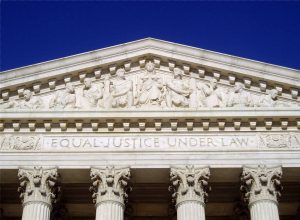
The following opinion piece appears in the Milwaukee Journal Sentinel:
Our system of justice rests upon two pillars: equal treatment and independent judgment. Every person who appears before our state courts expects to be treated equally to every other litigant. In addition, every party to a lawsuit expects to have his case heard by a judge who is free to exercise their own independent judgment. Recently, the state legislature in Madison and Governor Walker approved legislation – a $3 billion package luring Foxconn Technology Group to build a flat-screen TV factory in Racine County — that seriously undermines these two fundamental principles.
The principle of equal treatment commands that the same rules should apply to all parties appearing before the court. No one should receive special status. It is true that the two sides in a case might not be evenly matched, and that one might have more financial resources or a more skilled legal team. But, even then, both parties in the case should be subject to the same set of laws and procedures, and have the same opportunity to argue that the law supports their claim.
The Foxconn legislation creates special treatment for Foxconn whenever that corporation is sued in Wisconsin courts. The law forces the Wisconsin Supreme Court to directly take appeals involving “Electronics and Information Technology Manufacturing Zones” (EITM) from the circuit courts. By law there is only one such zone, and that zone is home to Foxconn. Typically, the high court would hear appeals at their discretion, and then only after the case was heard by an intermediate court. The reason for placing cases involving Foxconn on a “fast-track” to the Wisconsin Supreme Court should be obvious. That Court currently boasts a majority of Justices who were elected with the financial support of Wisconsin’s largest trade and manufacturing lobbyists. The drafters of the legislation expect these Justices to be sympathetic to the concerns of manufacturers like Foxconn.
We expect our state court judges to be free to exercise their independent judgment when deciding the merits of a case. It is the trial judge that hears the facts and the evidence, and who determines the appropriate remedy should the plaintiff prevail. It is not the state legislature’s job to decide which party in a case should win, or what remedy should be imposed in an individual case.


